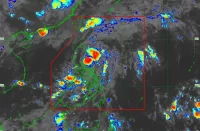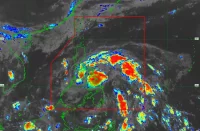QUEZON City, Philippines (February 21) – The Department of Justice (DOJ) has filed cases for violation of the Comprehensive Dangerous Drugs Act of 2002 against Senator Leila De Lima.
The three cases, which have each been raffled off to Branches 204, 205 and 206 of the Muntinlupa Regional Trial Court, stem from De Lima’s alleged involvement in the proliferation of the illegal drug trade in the New Bilibid Prison (NBP) when she was the secretary of justice.
The courts have 10 days to determine whether there is probable cause for the issuance of a warrant of arrest against De Lima.
But what is a warrant of arrest?
A Warrant of Arrest is a written order issued by a competent authority, directing the arrest of the body of a person or persons upon grounds stated there.
The warrant is sent to the police, who then arrests the subject. The subject may opt to post bail if the offense he or she was charged with is bailable. If not, he or she is taken into custody so he or she can be brought before the court.

The following are other useful terms:
Bench warrant or Subpoena
A bench warrant is issued by a judge or magistrate when he or she wishes for a subject to be arrested so he or she can appear before the court.
Bench warrants are typically issued for non-felony violations, such as failure to attend a court date or failure to pay a fine. It can be possible for a bench warrant to remain active for years without the subject being aware of such.

Outstanding Arrest Warrant
An outstanding arrest warrant is an arrest warrant that has not been served. A warrant may be outstanding if the person named in the warrant is intentionally evading law enforcement, or is unaware that a warrant is out for him/her. A warrant is also described as outstanding if the agency responsible for executing such has a backlog of warrants to serve. We may also be referring to an outstanding arrest warrant if a combination of these aforementioned factors is present.
Some places have laws placing various restrictions on persons with outstanding warrants. These laws may include the mandatory cancellation of the subject’s driver’s license or passport.
What happens upon the filing of cases in court
1. Within ten (10) days from the filing of the complaint or information, the judge shall personally evaluate the resolution of the prosecutor and its supporting evidence.
2. He or she may immediately dismiss the case if the evidence on record clearly fails to establish probable cause. No warrant of arrest is issued in this case.
If there is doubt on the existence of probable cause, the judge may order the prosecutor to present additional evidence within five (5) days from notice. The issue must be resolved by the court within thirty (30) days from the filing of the complaint of information.
3. If the judge finds probable cause, he or she shall issue a warrant of arrest, or a commitment order if the accused has already been arrested pursuant to a warrant issued by the court.
What are the principles governing the finding of probable cause for the issuance of a warrant of arrest?
There is a distinction between the objective of determining probable cause as done by the prosecutor and that done by the judge—the prosecutor determines it for the purpose of filing the complaint or information; while the judge determines it for the purpose of issuing a warrant of arrest to determine whether there is a necessity of placing the accused under immediate custody in order not to frustrate the ends of justice
Since the objectives are different, the judge shouldn’t rely solely on the report of the prosecutor in finding probable cause to justify the issuance of a warrant of arrest.
He must decide independently and must have supporting evidence other than the prosecutor’s bare report.
But did you know that a person can be arrested without a warrant of arrest?
Yes, an arresting officer may, without a warrant, arrest a person under each of the following circumstances:
When, in his or her presence, the person to be arrested has committed, is usually committing, or is attempting to commit an offense;
When an offense has in fact just been committed and the arresting officer has personal knowledge of facts indicating that the person to be arrested has committed it; and
When the person to be arrested is a prisoner who has escaped from a penal establishment where he or she is serving final judgment or is temporarily confined while his case is pending, or when he or she has escaped while being transferred from one confinement to another.
Sources:
BATASnatin Law Library (www.batasnatin.com)
Atty Kalibre (www.attykalibre.com)
Warrant Check Online (www.warrantcheckonline.com)
(written by Jodi Bustos, edited by Jay Paul Carlos)






